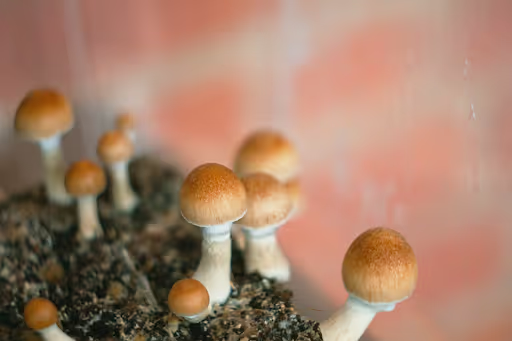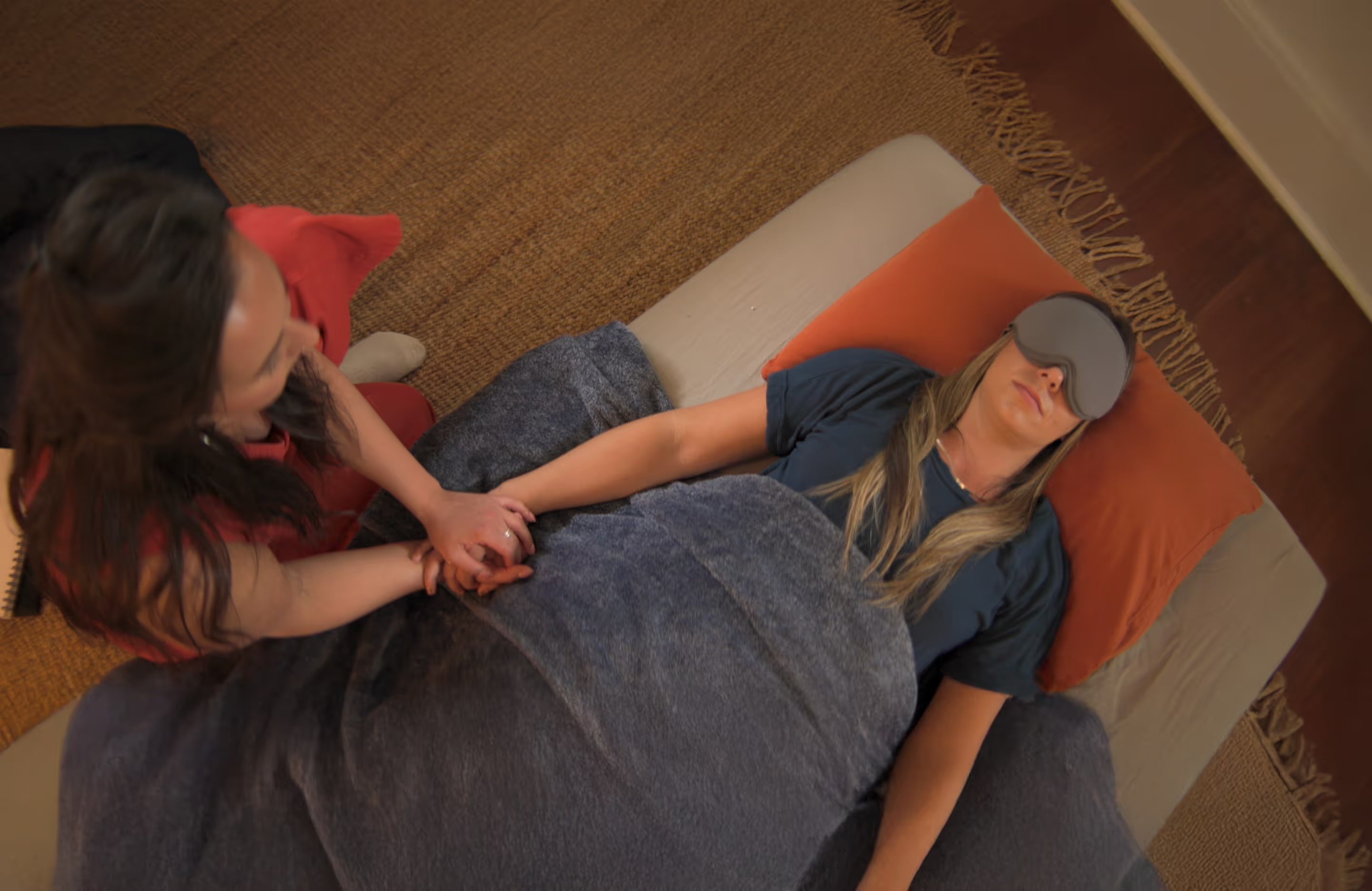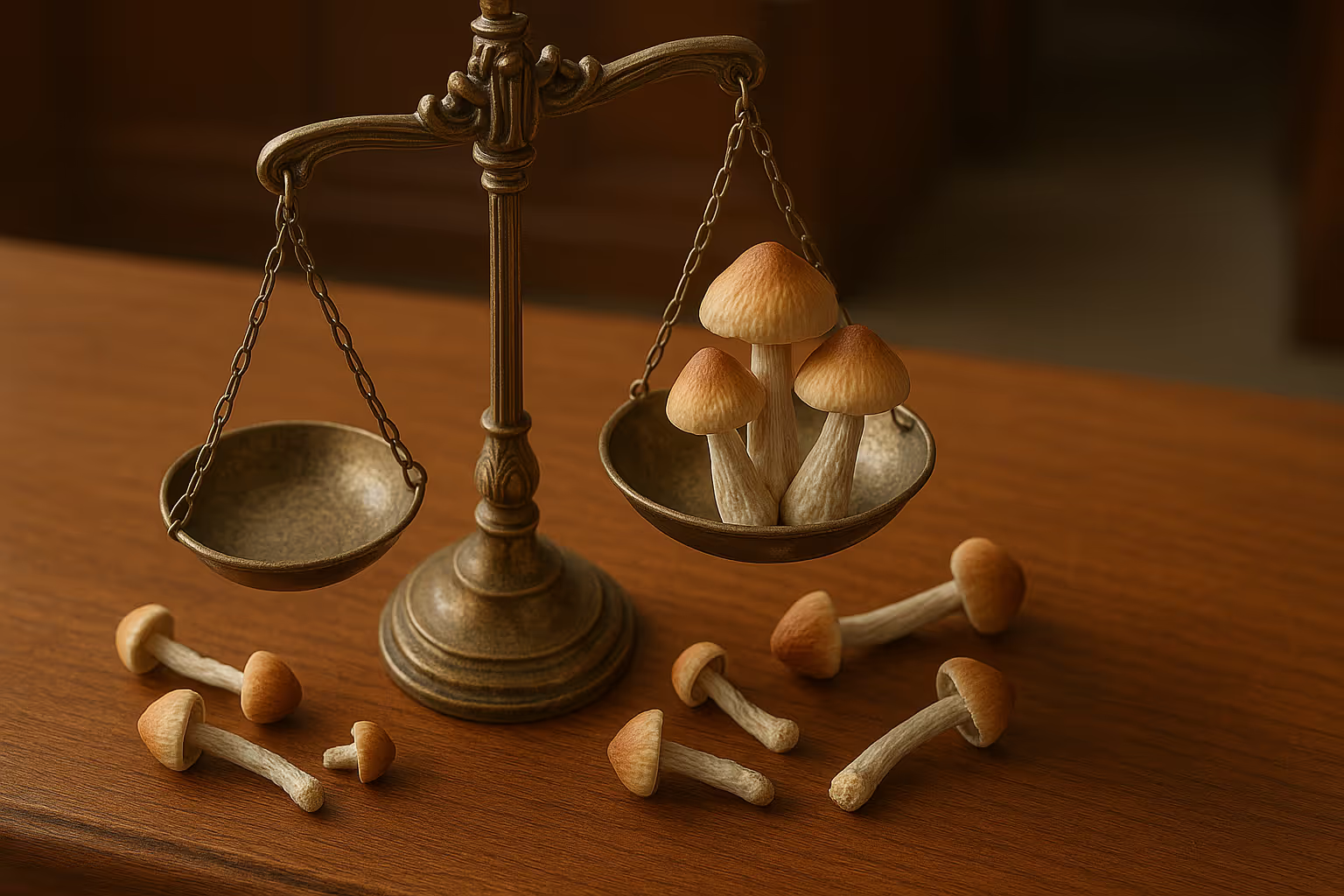Are Mushrooms Legal in Texas? What to Know (2025)

Psilocybin, the psychoactive compound found in "magic mushrooms," is gaining increasing attention in Texas for its potential therapeutic benefits, particularly in treating mental health disorders like depression, obsessive-compulsive disorder (OCD), and post-traumatic stress disorder (PTSD). However, its illegal status in the state remains stringent. For those in Texas curious about the therapeutic effects of psilocybin, understanding the current laws and regulations is essential before considering any type of exploration or therapy.
In this article, we’ll delve into the legal landscape governing psilocybin in Texas, explore the state’s stance compared to other regions, and examine the potential therapeutic applications of psilocybin that have been gaining attention nationwide. Additionally, we’ll discuss ongoing research and provide insights into accessing psilocybin in legal and safe environments outside the state.
What is Psilocybin?
Psilocybin is a naturally occurring psychoactive compound found in over 200 species of fungi, most commonly in Psilocybe cubensis, Psilocybe semilanceata, and Psilocybe cyanescens. When ingested, psilocybin is metabolized into psilocin, a compound that interacts with serotonin receptors in the brain, particularly the 5-HT2A receptor. This interaction induces altered states of consciousness, including changes in mood, perception, and cognition. Historically, mushrooms have been used for centuries in spiritual and healing ceremonies by indigenous cultures in Mesoamerica. Only recently has modern scientific research turned its focus to psilocybin’s potential therapeutic applications.
Are Mushrooms Legal in Texas? Status and Laws
As of April 2025, psilocybin mushrooms are illegal in Texas, classified under Penalty Group 2-A of the Texas Controlled Substances Act. This classification includes psilocybin alongside other hallucinogens, marking it as a substance with strict penalties for possession, cultivation, or distribution. Texas law does not differentiate between personal use or intent to sell, meaning even small amounts of psilocybin mushrooms can result in felony charges. Legislative efforts to decriminalize or legalize psilocybin in the state have been introduced, but none have succeeded in altering its legal status.
Sign up for Odyssey to stay in the loop on future legal, professionally-guided psychedelic experiences in Texas.
Texas Controlled Substances Act
In Texas, the legal status of psilocybin is governed by the Texas Controlled Substances Act. As mentioned, this act classifies psilocybin mushrooms as a controlled substance in the 'Penalty Group 2-A' category. This classification puts magic mushrooms in the same category as other serious drugs like MDMA, ecstasy, and some amphetamines. It considers psilocybin to have a high potential for abuse and a lack of medical efficacy—a view in consensus with the DEA and FDA’s Schedule I classification of psilocybin.
The Texas Controlled Substances Act governs psilocybin under Penalty Group 2-A, making it illegal to manufacture, possess, or distribute the substance. Penalties for psilocybin-related offenses vary by quantity but are uniformly severe. For instance:
- < 1 gram: State jail felony (up to 2 years in jail)
- 1–4 grams: Third-degree felony (2–10 years in prison)
- 4–400 grams: Second-degree felony (2–20 years)
- > 400 grams: First-degree felony (5–99 years and fines up to $250,000)
Decriminalization vs. Legalization
In Texas, neither decriminalization or legalization has occurred for psilocybin. However, there have been some legislative efforts to change this. In 2021, House Bill 1802 was a major milestone, mandating a study into psilocybin’s effects on veterans with post-traumatic stress disorder, though it died in the Public Health committee in March 2023. That same year, further bills, including HB 4288, HB 4423, and HB 4561, were also introduced to expand research into psilocybin, MDMA, and ketamine.
Here is what each bill proposed, along with its current status.
Texas House Bill 4288
- Overview: The bill proposed an amendment to a 2021 law focused on researching alternative therapies for PTSD in veterans. It directed the Texas Health and Human Services Commission, in collaboration with Baylor College of Medicine, to study the efficacy of MDMA, psilocybin, and ketamine in treating PTSD. The study involved clinical trials, reviewing existing literature on the safety and efficacy of these substances, and assessing veterans' access to such therapies.
- Status: Died in committee
Texas House Bill 4423
- Overview: The Psilocybin Research Advisory Council Bill aimed to establish a council to advise the Texas Health and Human Services Commission on psilocybin research and treatment. The council would oversee clinical trial research grants for conditions such as PTSD, depression, and chronic pain, prioritizing studies using whole mushroom psilocybin. Veterans, first responders, and underserved communities were targeted as research subjects. The bill also protected participants from prosecution for psilocybin possession while working on these trials.
- Status: Died in committee
Texas House Bill 4561
- Overview: This bill would have established the Texas Alternative Mental Health Therapy Research Consortium, consisting of academic scholars, medical professionals, and representatives of psychedelic advocacy groups. Its purpose was to research the efficacy of using psychedelics and ketamine in treating veterans' mental health conditions, such as PTSD and depression. The bill also proposed creating a grant program to fund ketamine clinics and developing a voucher system to provide veterans with ketamine therapy. Additionally, it mandated a study to evaluate alternative therapies, including ibogaine and 5-MeO-DMT.
- Status: Died in committee.
These legislative efforts indicate a growing interest within the Texas Legislature to explore the potential benefits of psilocybin and other alternative therapies, particularly for mental health conditions like PTSD. However, as of early 2025, no significant legislative changes have been enacted regarding the legalization or decriminalization of psilocybin in Texas. The outcomes of these proposed studies and the evolving national discourse on psychedelic therapies may influence future policy decisions within the state.
How to Legally Access Psilocybin in Texas
As of April 2025, there exists no legal pathway to access psilocybin for therapeutic or personal use in Texas. The state has not made significant progress toward decriminalization or legalization of psilocybin, and possession remains a felony offense under the Texas Controlled Substances Act. While other states have moved forward with reform, Texas continues to classify psilocybin mushrooms as a controlled substance with severe legal penalties. While legislative efforts to permit psychedelics for PTSD treatment are ongoing, legal changes await enactment.
For those looking for immediate psilocybin-assisted support, Odyssey offers psilocybin services in the form of group retreats and private sessions that are legal, professionally guided, and science and evidence-based in Oregon. Get matched to the right experience for you.
Medical and Therapeutic Applications
Modern clinical studies continue to validate psilocybin’s potential for a wide range of mental health conditions. What sets psilocybin therapy apart from conventional pharmaceuticals is the durability of its effects—often from just one or two sessions—and its ability to address the root of psychological distress rather than merely alleviate symptoms.
Read: The Safety of Psilocybin Therapy
Mental Health Treatment
Psilocybin has become a key focus of clinical research for its potential in treating various mental health conditions. Its promising therapeutic applications have been studied at institutions like Johns Hopkins University and other renowned research centers, providing new insights into its ability to help individuals with chronic psychological issues.
- Depression
Psilocybin has demonstrated significant potential in treating depression, including in individuals with treatment-resistant depression. Findings from research trials published in The New England Journal of Medicine found that a single therapeutic dose of psilocybin, combined with psychological support, produced rapid and substantial reductions in depressive symptoms. These effects were sustained for several weeks, providing hope for individuals who were historically unresponsive to conventional antidepressant therapies.
- Anxiety
Psilocybin-assisted therapy has shown promising results in reducing anxiety, particularly in patients experiencing existential distress, such as those with terminal illnesses. Studies have found that psilocybin can lead to long-lasting decreases in anxiety and improvements in mood for individuals facing life-threatening diseases. - Post-Traumatic Stress Disorder (PTSD)
Research into the use of psilocybin for PTSD remains in its early stages, but initial findings are promising. Psilocybin appears to help patients reprocess traumatic memories without the overwhelming fear typically associated with them, aiding emotional healing. By altering brain connectivity and increasing cognitive flexibility, psilocybin may allow individuals to overcome the "cognitive rigidity" that keeps them stuck in cycles of trauma and distress. - Substance Use Disorders
Psilocybin-assisted therapy is also being explored as a treatment for substance use disorders. Studies have shown that psilocybin, combined with cognitive-behavioral therapy (CBT), helps individuals reduce or eliminate dependence on substances such as alcohol and nicotine. One study found that 67% of participants who underwent psilocybin-assisted services practiced smoking abstinence a year after treatment.
Ongoing Research
The Center for Psychedelic Research and Therapy at Dell Medical School at UT Health Austin leads Texas-based psilocybin research, focusing on innovative treatments for mental health disorders. Their mission includes:
- Conducting clinical trials on psilocybin and other psychedelics
- Investigating brain mechanisms, psychological outcomes, and biomarkers
- Exploring AI-driven tools to personalize psychedelic therapies
- Educating healthcare providers on safe, effective treatment models
Though psilocybin remains illegal in Texas, Dell Medical School’s work could pave the way for future policy change by establishing a rigorous, evidence-based framework for its therapeutic use. Their primary goal is to support individuals, especially veterans and trauma survivors, through clinical research and psychedelic-assisted therapy, while also educating a broader community.
Conclusion: A Climate of Legal Change in Texas
As of 2024, psilocybin remains illegal for personal use in Texas, but ongoing research is shedding light on its potential therapeutic applications. Although the legal landscape in Texas remains restrictive, institutions like UT Health Austin are leading the charge in exploring psilocybin’s efficacy for mental health treatment. This research could eventually influence legislative changes within the state.
For now, those interested in psilocybin therapy may need to look outside Texas to states like Oregon and Colorado, where psilocybin has been decriminalized and is accessible under licensed therapeutic settings. Programs like those offered by Odyssey provide safe, professional access to psilocybin retreats and sessions, ensuring that individuals can explore these experiences in a controlled, evidence-based environment.
The future of psilocybin in Texas is uncertain, but as research advances and public awareness grows, we may see further discussions around decriminalization or legalization, especially as more data emerges on its potential benefits. In the meantime, Texans can stay informed about the current legal status and should tread carefully when considering any involvement with psychedelic substances.
Frequently Asked Questions (FAQs)
Is psilocybin legal in Texas? No, psilocybin is illegal in Texas. It is classified under Penalty Group 2-A of the Texas Controlled Substances Act, meaning possession, use, or distribution of psilocybin-containing mushrooms can result in felony charges with severe penalties.
What are the penalties for psilocybin possession in Texas?
Penalties range from 6 months in a state jail (for <1 gram) to life in prison and a $250,000 fine (for >400 grams), depending on the quantity and circumstances.
Can psilocybin be used for medical purposes in Texas? As of now, psilocybin cannot be legally used for medical purposes in Texas. However, research initiatives, such as those at Dell Medical School’s Center for Psychedelic Research and Therapy, are exploring its potential for treating mental health conditions like PTSD and depression, which may pave the way for future therapeutic use.
What mental health conditions can psilocybin help treat? Research suggests that psilocybin may be effective in treating a variety of mental health conditions, including treatment-resistant depression, anxiety, PTSD, and addiction. Clinical studies show that psilocybin, when used in controlled environments, can provide long-lasting relief from symptoms.
Is psilocybin research being conducted in Texas? Yes, psilocybin research is actively being conducted in Texas. The Center for Psychedelic Research and Therapy at Dell Medical School in Austin is leading studies focused on the therapeutic potential of psychedelics for treating conditions like PTSD, depression, and anxiety.
Can I legally access psilocybin in Texas for therapeutic use? Currently, there is no legal access to psilocybin for therapeutic use in Texas. However, the state has authorized studies to explore psilocybin’s potential benefits for mental health, particularly for conditions like PTSD in military veterans.
Where can I legally access psilocybin if I live in Texas? Although psilocybin is illegal in Texas, residents can access legal, professionally guided psilocybin therapy in states like Oregon and Colorado, where psilocybin use is regulated. Organizations like Odyssey provide access to legal retreats and private sessions in these states.

.svg)









.svg)